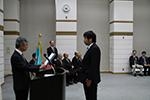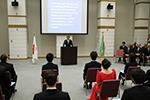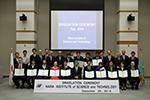2014/09/26
On Thursday, September 25, 2014, a graduation ceremony was held in the Training Hall in the Center for Frontier Science and Technology.
President Ogasawara presented degrees to each graduate and gave the congratulatory speech to the 14 graduates.
After the ceremony, the commemorative photograph was taken and the graduates enjoyed the graduation ceremony with the president, executive directors and their supervising professors.
*Number of Graduates in September
【Master's Graduates】
Information Science 7
【Doctoral Graduates】
Information Science 3
Biological Sciences 3
Materials Science 3
[Congratulatory Remarks to Graduating Students]
First, I would like to congratulate the 7 master's program students and 9 doctoral program students that received their degrees today.Among today's graduates are 10 international students, bringing the total number of graduates from overseas to 327 students from 49 countries/regions. It pleases me greatly to see our network of graduates continuing to expand not only in Japan, but also overseas.
A number of today's master's program graduates will continue on to rigorous studies as doctoral students, while the majority of you will begin new, independent lives working as scientific researchers or technical staff in industry and academia.Currently, the world is undergoing rapid change as information, people, and goods flow easily across borders, allowing various countries in Asia and Africa to develop economically.As a result, the importance of addressing several serious problems has become increasingly clear, including global resource and energy scarcity, global climate change, and how to maintain the development of modern society.To this end, we must reform the current model of societal development, which is based on the pursuit of material affluence, and the mass production / mass consumption behavior it creates.
At the same time, it is important to point out that this new world also lays the foundation for new developments in science and technology.In the current era, the whole world is connected in real time through the Internet, allowing the world's vast data to be utilized comprehensively, which will play an integral role in sustaining a new society.In addition, revolutionary genomic DNA sequence technology has made it possible to acquire and analyze huge amounts of data from a diverse range of living organisms. With a vastly improved understanding of organisms and cellular level activities, we are clearly in the midst of a 'big data biology' paradigm shift.Similarly, in materials science, advanced analysis and measurement techniques have provided us with a new, more intricate view of the material world, and these advances also support the development of information and biological sciences.It is highly likely that future developments in science and technology will surpass our current imagination.
As a graduate of NAIST, I would like you to actively approach creating a new society and world by creating and practicing new science and technology.Regarding what will be necessary in your endeavors, I would like to introduce a topic that is being discussed lately at the MEXT committee. The discussion is about scientific research, but it is also related to technological development.
In order for scientific research to serve as a "source of national strength", it is of utmost importance to cultivate new knowledge, and it is vital for researchers to keep in mind and clarify the significance of their own research subject. To cultivate new knowledge in the midst of accelerating globalization and information exchange, you must place a high value on diversity in scientific research and continue to build upon expert academic knowledge of traditional fields, all the while maintaining a broader, comprehensive view to avoid compartmentalized knowledge.You are also faced with demands to produce new academic domains through cooperation and collaboration with researchers from various fields and a broad range of domestic and foreign counterparts.In addition, through discussion and verification within the global science community, you must strive to obtain global recognition of your research excellence by proposing new research frameworks, thus contributing beyond national borders.
Therefore, researchers are expected to seek new knowledge in a flexible manner, unlimited by traditional borders between research fields and institutions.As global citizens, you must work hard to cooperate and compete with those of different values and cultures, all the while adapting to changes in society and constantly endeavoring to produce novel research findings.
Furthermore, one of the characteristics of science and technology today is the ever-closing distance between the results of basic scientific research and their development and application in society. This current, close relationship represents clearly that the societal developments from science and technology research lead once again to advancements in science and technology.With this in mind, those focusing on basic research should also consider the viewpoint of researchers working to solve societal problems. Likewise, those pursuing technological solutions to societal problems should pay close attention to the developments in basic research.
Now I would like to share with you some words that impressed me recently on the topic of the future of NAIST graduates.
As part of a career support program for NAIST students, a symposium was held which featured NAIST graduates who have received doctoral degrees in information science, biological sciences, and materials science and who are presently working successfully in private enterprises.Among them, one of the speakers addressed our students enthusiastically, pointing out that, in addition to the elementary knowledge acquired at NAIST, all graduates also possess invaluable experience which they acquired throughout their thesis research: Investigating problems, formulating possible solutions, putting them into action, evaluating results, discussing with countless people, and pulling it all together for publication. Such rich experiences serve as excellent preparation for pursuing new assignments in new environments. I am confident that your experiences studying and producing research publications at NAIST assure that you will all carry out creative lives.
Moreover, NAIST's role does not end with us sending you out into society. Rather, the faculty feels that another important role of NAIST is the enduring relationship with the graduates who will continue their creative lives in an ever-changing community of science and technology, and in society writ large. The specific measures for this are yet to be determined, but the NAIST faculty and staff hope to support you as you press the frontier forward.
My heartfelt congratulations to you all. We look forward to your future success.
President Naotake Ogasawara,
Nara Institute of Science and Technology, September 25, 2014







